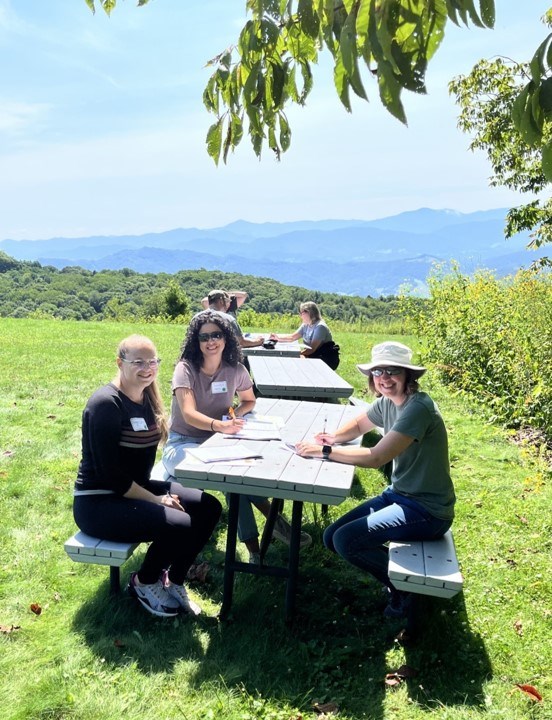Collaboration is required to respond to the ever-changing stewardship issues that today's conservation leaders face. We have demonstrated effective engagement by focusing on facilitating collaboration and dialogue among leading-edge thinkers from all levels of the conservation community. These dialogues ensure time and space for reflection and meaningful exchange. They create avenues for bringing new thinking in from the edges, often yielding transformative outcomes.
Highlighted Projects

NPS Photo
Park for Every Classroom (PEC)
The goal of Park for Every Classroom (PEC) is to connect teachers and community partners with national park staff around the country and to encourage the use of national parks as extensions of the classroom. This is a program co-facilitated by the Stewardship Institute and Shelburne Farms, with assistance from the NPS Washington Support Office for Interpretation, Education, and Visitor Services. PEC teams consist of park staff, community partners and educators who work collaboratively to develop professional learning for teachers. Teachers then encourage student stewardship by providing experiences that are relevant and meaningful in their communities.
PEC began in Region 1 in 2011 and since then 15 northeast parks have offered more than 40 professional development workshops. These have given teachers the tools, resources, and support they need to develop curriculum for thousands of students. PEC expanded nationwide in 2022, with 7 parks from around the country coming together to create teacher professional development based around Equity Centered Climate Change Education (ECCCE). The parks that participated in the first year of the national pilot were:
- African Burial Ground National Monument
- César E. Chávez National Monument
- Cuyahoga Valley National Park
- Everglades National Park
- Great Smoky Mountains National Park
- Hawai’i Volcanoes National Park
-
Saguaro National Park
By coming together at workshops, these PEC teams supported educators in creating experiences that will make the impacts of climate change tangible for students, illustrate complex issues, help forge meaningful connections to place, and cultivate stewardship for land and community. This national pilot continued in 2023. The second cohort includes:
- Canaveral National Seashore
- National Park of American Samoa
- Marsh-Billings-Rockefeller National Historical Park
- National Mall and Memorial Parks
- Lowell National Historical Park
- Abraham Lincoln Birthplace National Historical Park
To assess the PEC model and what we are learning from scaling the program, a program evaluation is being led by PEER Associates, an independent evaluation firm specializing in place-based education. PEER has conducted 15 interviews with a total of 23 people (13 park level staff primarily from Region 1, 5 partner organization staff, and 5 national level park staff).
You can learn more about Park for Every Classroom and the participating parks by visiting: Park for Every Classroom

NPS Photo
Building a Strong Chesapeake Gateways Network
Chesapeake Gateways Network is a system of places providing opportunities to enjoy, learn about, and help conserve the Chesapeake Bay and its watershed. Included in the Network are diverse natural, cultural, historical and recreational sites, trails, museums, parks, refuges, interpretive and orientation facilities and associated programs. These places and the Network as a whole, serve as entry points and the key guide for experiencing the Chesapeake watershed.
The Stewardship Institute has been a longtime partner with the National Park Service Chesapeake Bay Office. Together with QLF, a long time Institue partner, we are providing technical assistance towards advancing a bold new strategy to strengthen the Chesapeake Gateways Network; gather and share the full diversity of Chesapeake stories; expand land conservation; provide equitable access to recreation, history and nature; support local and working economies at a community level; and engage an inclusive and deep Chesapeake stewardship and resiliency movement benefitting all.

Managing By Network
The Stewardship Institute is a co-host for Managing by Network, an inter-agency course designed for public agency managers, specialists, coordinators, and front-line supervisors run by the Partnership and Community Collaboration Academy. It is a series of 18 live, interactive webinars and 5 study hall weeks that are presented weekly from January to June.
The curriculum for this course centers on the 22 partnership and community collaboration competencies defined by the Office of Personnel Managment (OPM). In this course, members learn from subject matter experts from across agencies and organizations how to:
- Leverage partnerships and build trust
- Build consensus with stakeholders
- Facilitate internal and external meetings
- Apply persuasion and negotiation strategies
- Recognize conflict and respond effectively
- Assess and mitigate risks
- Demonstrate accountability practices
- Assess the performance of partnerships and community collaboratives
- Build an internal network to support agreements, budgets, and outreach
The Stewardship Institute provides several scholarships for National Park Service participants. You can learn more and apply here: https://www.partnership-academy.net/managingbynetwork/. Applications open yearly in October.
Last updated: May 30, 2024
